A Guide to Types of Non-Dairy Milk, and How to Choose the Right One
Plant milk has taken an important place in the diet of many people. It’s not just a trendy product, but also a worthy replacement for cow’s milk which some people can’t drink because of their lactose intolerance, or for other reasons.
At 5-Minute Crafts, we decided to find out about the most popular types of non-dairy milk, what their health benefits are, and whether it’s really necessary to replace cow’s milk with one of them.
What plant milk is
Plant milk is a drink that is similar to animal milk in many ways — in color, texture, use, and even taste to some extent. In fact, this is basically a drink made from a plant extract, water, and additives.
But don’t be mistaken in thinking that this is a modern product. Plant milk has been used for centuries. The African drink horchata, made from ground and sweetened tiger nuts, spread to Iberia before the year 1000. The word “milk” has been used to refer to “milk-like plant juices” since the 13th century. There are recipes for almond milk from the same period, and soy milk began to be produced in China in the 14th century.
“Non-dairy” or “alternative” milk, as it’s called these days, has been used for many different purposes over the years. It’s not only an aromatic drink but also an ingredient in sweet or savory dishes, like coconut milk in curry. Now it’s often used to make plant-based, vegan ice cream, cream, cheese, and yogurt.
Plant milk is popular for those who are lactose intolerant, who have an allergy to cow’s milk, who are concerned about the calorie content of cow’s milk, and who are practicing a vegan diet.
The nutritional value of “alternative” milk depends primarily on the manufacturers who, nevertheless, try to enrich their products with trace elements that are present in cow’s milk.
What plant milk can be made from
Non-dairy milk can be made from a wide variety of plants.
- Grains: barley, corn, millet, oats, rice, rye, sorghum, teff, triticale, spelt, wheat
- Pseudocereals: amaranth, buckwheat, quinoa
- Legumes: lupins, peas, peanuts, soybeans
- Nuts: almonds, Brazil nuts, cashews, hazelnuts, macadamia, pecans, pistachios, walnuts
- Seeds: chia, flax, pumpkin, sesame, sunflower
- Others: coconut, potato, tiger nut
The process of plant milk manufacturing
The process of making each type of non-dairy milk has its own peculiar features, depending on the starting plant material.
For example, the production of soy milk consists of the following steps:
- cleaning and soaking the beans
- grinding the starting material to obtain a slurry, a powder, or an emulsion
- heating the processed plant material
- removing solids by filtration
- adding water, sugar (or sugar substitutes), and other ingredients to improve taste, aroma, and micronutrient content
- pasteurizing the liquid
- homogenizing the liquid to break down fat globules and particles
- packaging, labeling, and storing at 34°F
Interestingly, the actual content of the plant used in non-dairy milk may only be about 2%.
Other ingredients typically include guar gum, xanthan gum, or sunflower lecithin for texture and flavor, micronutrients (like calcium, B vitamins, and vitamin D), salt, and natural or artificial ingredients that add flavor.
Coconut milk
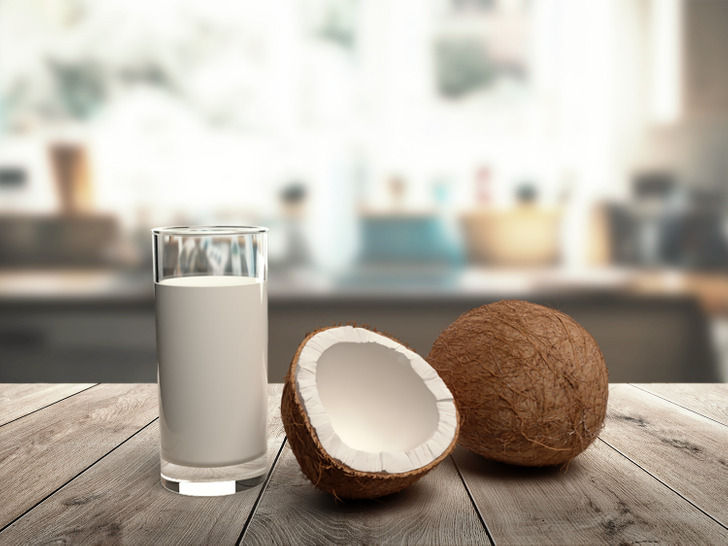
There are 2 types of coconut milk: thick and concentrated milk for adding to various dishes, like soups and curries, and light and refreshing milk for smoothies, coffee drinks, or cereals. Coconut milk gives food an unsurpassed flavor.
This drink is a source of nutrients. Coconut contains medium-chain triglycerides, which are healthy fats that help achieve a healthy weight by increasing metabolism, regulating hunger hormones, and increasing fat oxidation.
At first glance, it seems that the saturated fats contained in the milk are a disadvantage. But those found in coconut milk significantly improve good cholesterol levels, reduce oxidative stress and blood pressure, and boost immune function. Even though coconut milk is not rich in protein, it’s rich in manganese, potassium, magnesium, calcium, and sodium—essential electrolytes that support athletic performance, post-workout recovery, and longevity.
Soy milk
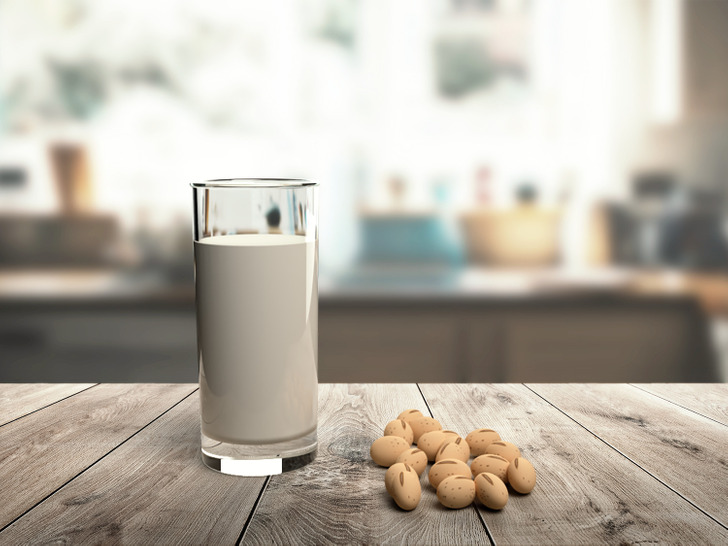
Soy milk is a rich, thick drink with a creamy taste. It’s good for whisking which means it’s an excellent ingredient for making a cappuccino and latte. It can also be used in baking.
This drink contains useful substances, including protein. Soy milk is not inferior to cow’s milk in the protein content. Many manufacturers fortify this drink with calcium and other vitamins like B12, B2, D, and A to make it a full alternative to animal milk. Soy milk is low in fat.
However, there is an opinion that soy milk also has a negative effect on the body due to the content of harmful substances.
Almond milk
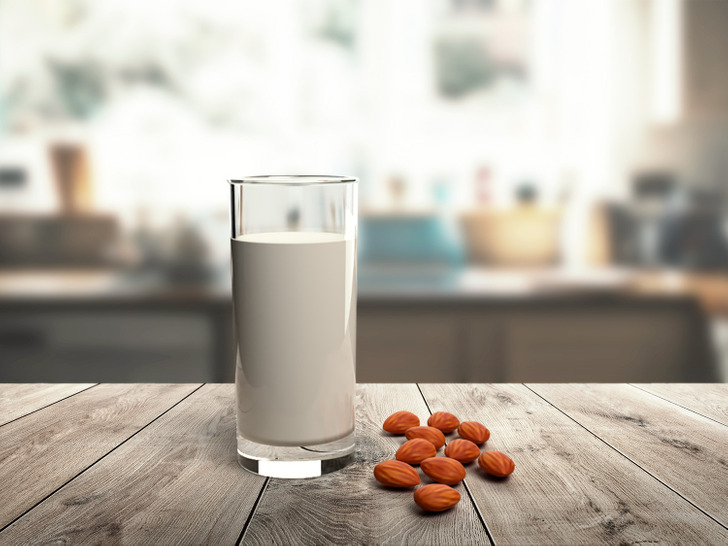
Almond milk has a light creamy texture, and a mild and slightly nutty flavor. It can easily be whisked into a foam which is why it’s often used in making coffee drinks. Its neutral taste is good for sweet or savory dishes. It’s often added to teas and smoothies, and used in desserts, baked goods, and cereals.
Compared to soy milk or cow’s milk, almond milk is lower in calories and protein. There is also little fat in it, and the fat that is there is healthy unsaturated fat. Homemade almond milk can be high in calcium if a sufficient amount of nuts was used.
An important benefit of this drink is its high content of vitamin E, an antioxidant that combats inflammation and stress, helps protect against heart disease and cancer, and improves bone, eye, and brain health. It’s also high in the mineral zinc which makes your skin glow and prevents hair loss.
Cashew milk
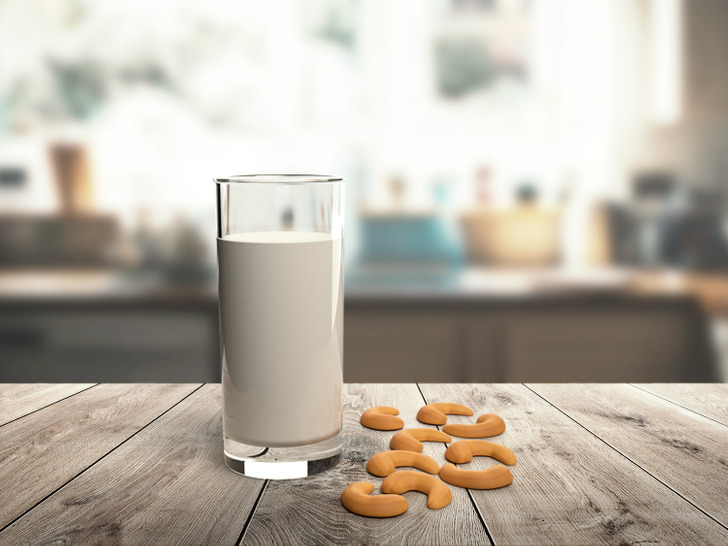
Cashew milk is not the most popular type of plant milk but it should not be overlooked. It’s made from whole nuts or cashew butter, it has a pleasant, creamy, nutty flavor, and it’s suitable for a variety of dishes, including baking. Cashew milk is easy to whisk which makes it easy to use in coffee drinks. It’s also a perfect drink for those who want to lose weight.
This beverage contains calcium, vitamins D and B12, and mostly healthy unsaturated fats. It’s rich in magnesium and iron, as well as the antioxidants lutein and zeaxanthin which are good for eyesight. It also contains vitamin K which is vital for blood clotting, zinc which boosts immunity, and copper which plays a big role in keeping your skin healthy and youthful-looking.
Hazelnut milk
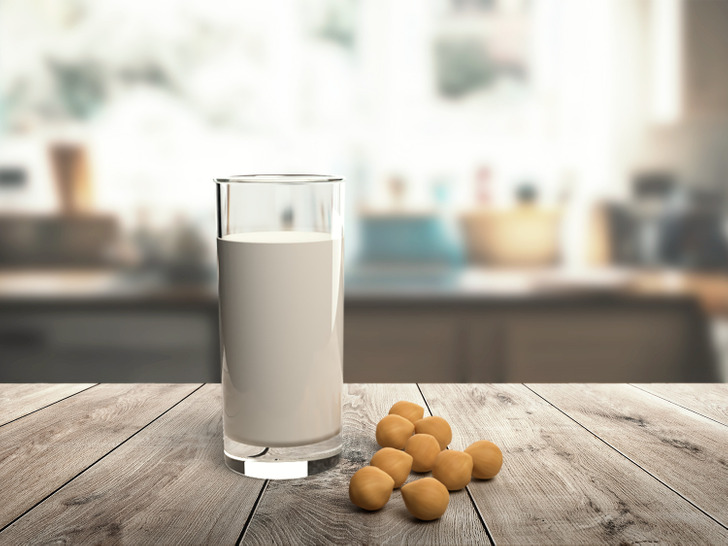
Hazelnut milk has many benefits. It’s good for coffee, oatmeal, hot chocolate, smoothies, baked goods, and other dishes thanks to its rich and delicate taste.
In addition, this beverage is known for its antioxidants. It’s rich in vitamin E and healthy fats.
A cup (8 ounces) of hazelnut milk contains 30 to 90 calories, 1 to 2 g of protein, and up to 1 g of fiber. It’s usually unfortified and therefore contains small amounts of potassium, iron, and calcium.
Pistachio milk
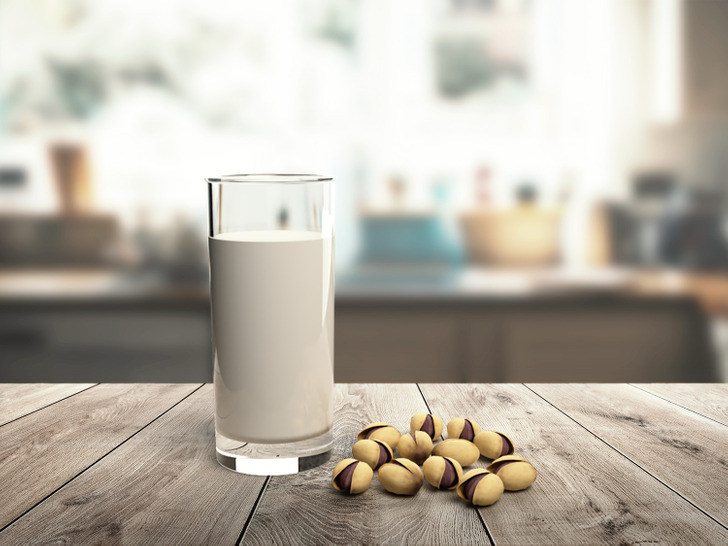
Pistachio milk has a pleasant buttery texture and pistachio flavor and is good for hot chocolate and tea, as well as for baked goods like muffins or bread.
Pistachios are rich in potassium and vitamins K and B6, monounsaturated fats, oleic acid, and antioxidant nutrients like carotenoids and phytosterols. Pistachio milk is one of the highest protein cow milk alternatives.
This milk is usually not fortified. Most often, sugar is not added to it, so it is suitable for people with diabetes.
Macadamia milk
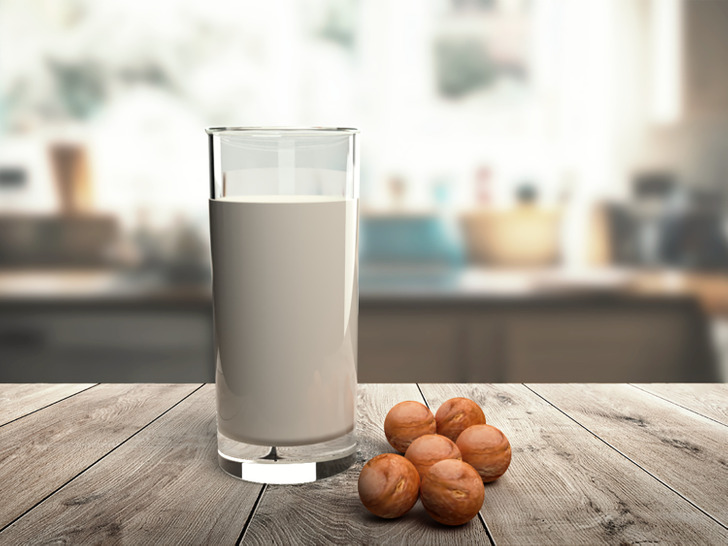
Macadamia milk has a neutral taste, so it doesn’t overpower the flavors of the dishes you add it to. It doesn’t contain sugar but it has a sufficient amount of healthy fats. Many manufacturers fortify the drink with vitamins D and B12 and calcium, but macadamia itself is rich in nutrients, like magnesium, iron, and zinc.
This milk is low in calories and carbohydrates but also low in protein.
This beverage has a creamy texture, so it’s suitable for coffee, smoothies, and muesli, and can also replace coconut milk in curries and other dishes.
Rice milk
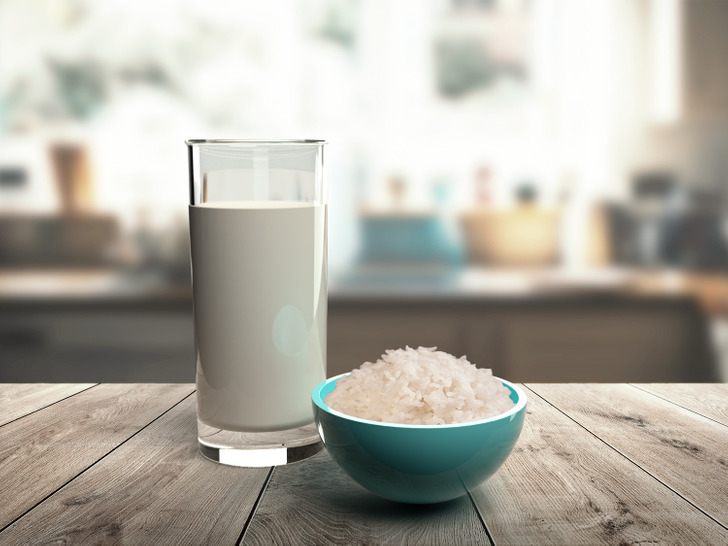
Rice milk is a light beverage made from white or brown rice and water.
This milk is low in fat, and it doesn’t contain allergens which is its main advantage. It contains a large amount of B vitamins and a significant dose of antioxidants like manganese and selenium.
During processing, the carbohydrates of rice milk are split into sugars which gives this beverage its typically sweet natural taste.
Oat milk
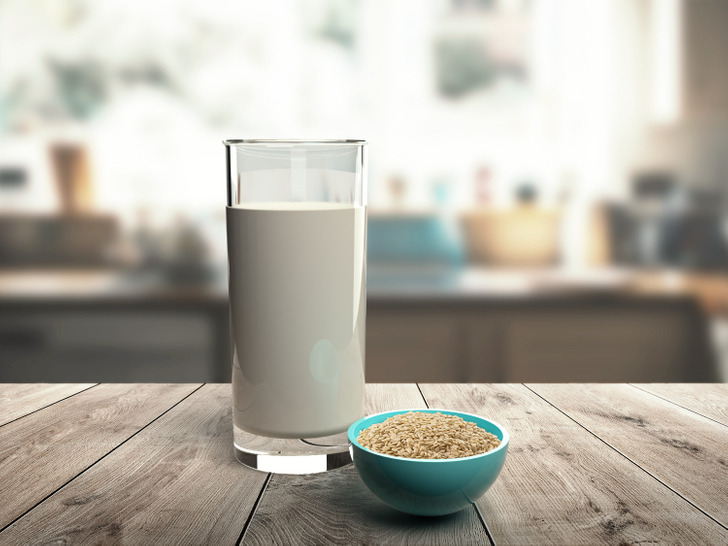
Oat milk is slightly sweet and similar to low-fat cow’s milk in taste. Due to its high content of dietary fiber, phytochemicals, and antioxidants, oats are a particularly healthy food containing potassium, iron, and vitamins A, D, and B12. Oat beverages contain the soluble fiber beta-glucan, thiamine, and folic acid, as well as the minerals magnesium, manganese, phosphorus, zinc, and copper. Oat milk is suitable for people with lactose and nut allergies.
It goes well with cereals and is suitable for baking. It’s also a great ingredient for tea and coffee because it froths well.
Buckwheat milk
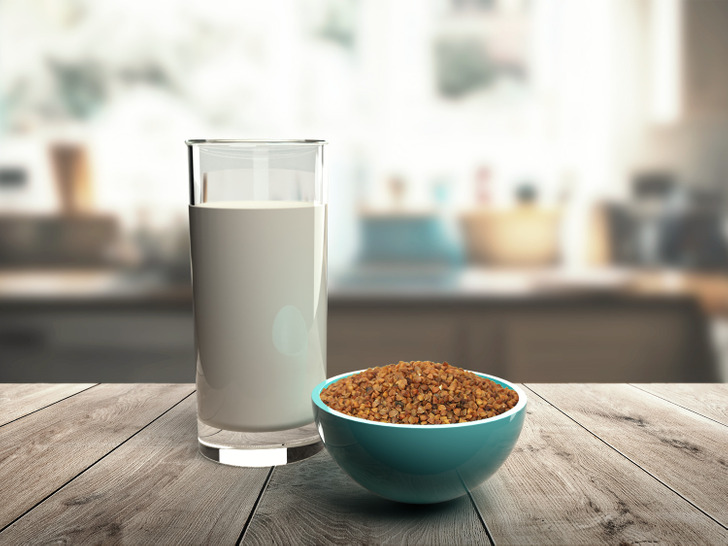
This milk is made from buckwheat, so it’s gluten-free. It can be widely used in cooking. For example, it can be added to muesli, protein drinks, etc. But unlike many other types of plant milk, it’s not suitable for baking due to the lack of white gluten that connects the ingredients.
Buckwheat milk is rich in nutrients. It has a lot of protein and 8 valuable amino acids that the human body can’t produce on its own. At the same time, the fat content is low. It’s rich in vitamins A, B and E, as well as minerals, folic acid, and manganese.
Walnut milk
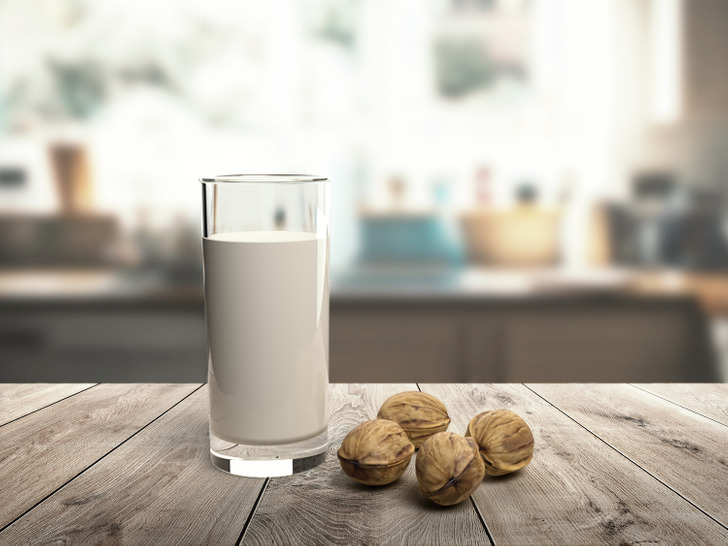
Walnut milk has a unique taste. It is suitable for both drinks and baked goods like cakes and chocolate chip cookies.
Walnut milk is rich in omega-3s, antioxidants, and essential fatty acids that help brain function and may reduce the risk of heart disease. This beverage is a good source of fiber, it’s low in carbohydrates, and high in fat and protein.
Peanut milk
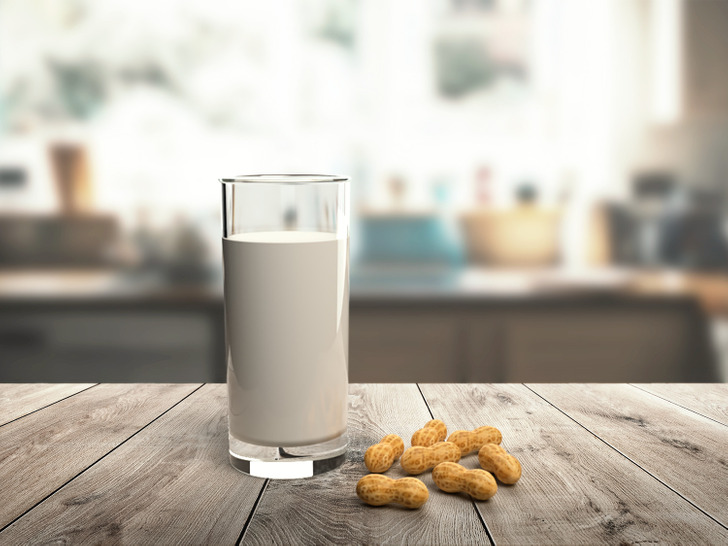
Peanut milk is made from peanuts, water, and sometimes other additional ingredients like salt, sugar, or cinnamon. This type of non-dairy milk is high in magnesium, vitamins B6 and E, and protein.
It is generally used as a substitute for dairy products like coffee creamer or yogurt.